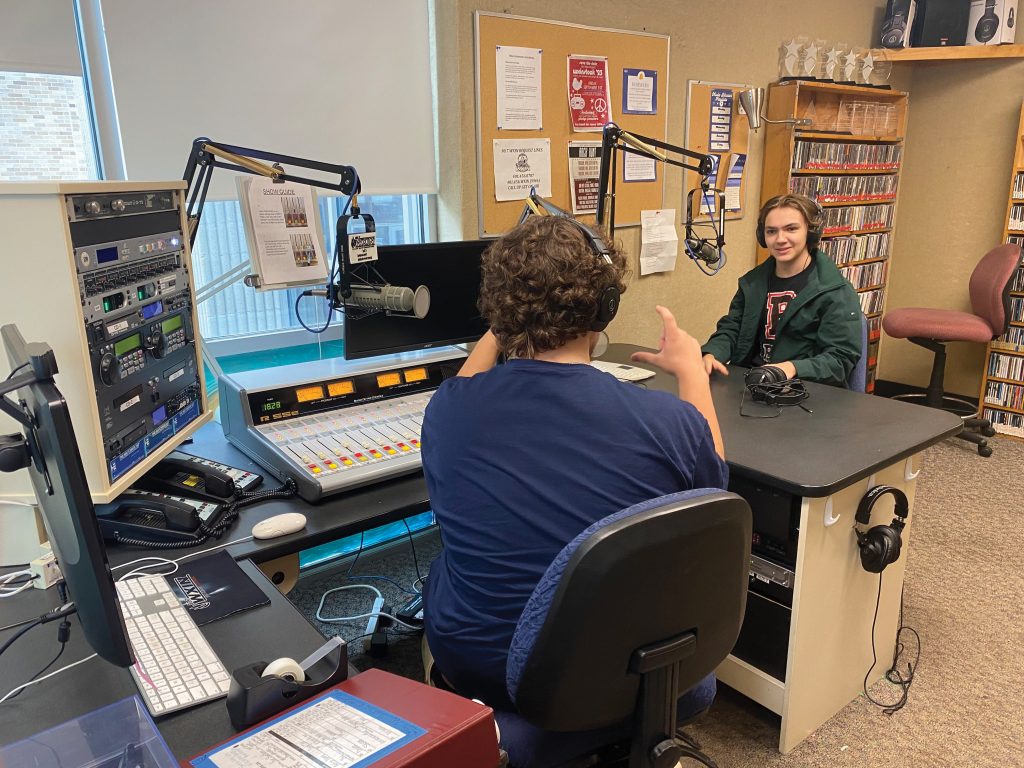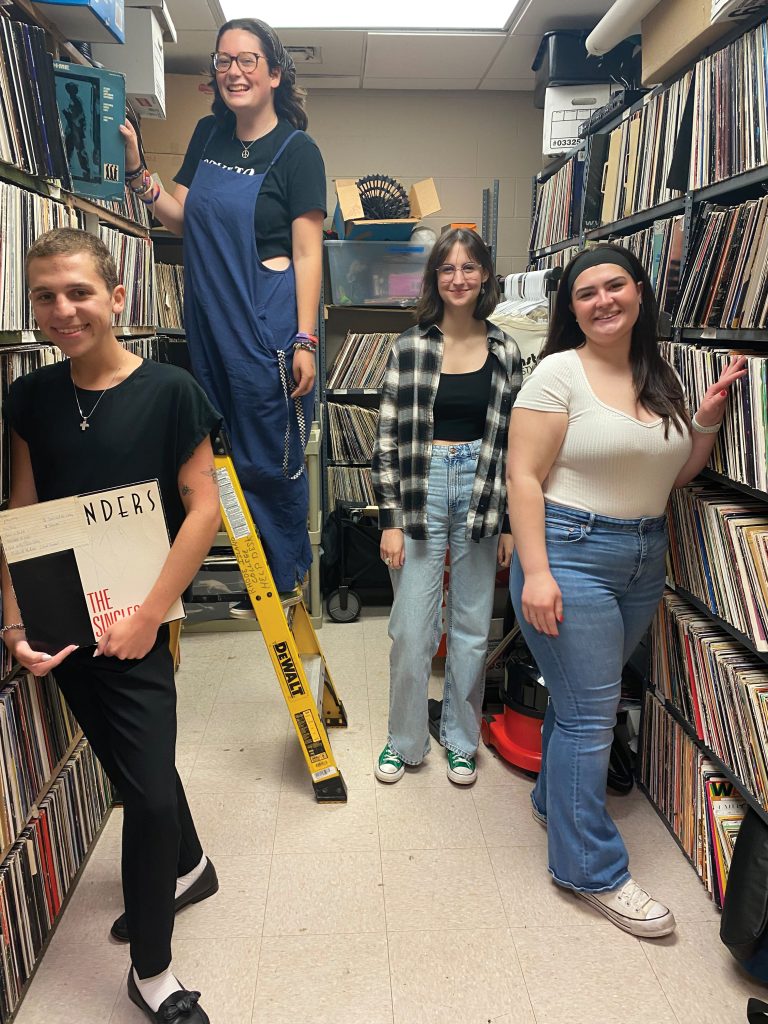
For many students, studying and music go hand-in-hand. Before there were airpods, there were wired headphones slipped under the sleeve of a hoodie and inconspicuously held to an ear in study hall. Before there was streaming, there was Napster. Before that, there was a radio. Generation after generation of students found ways to listen throughout the school day, whether it was an iPod in their pocket or a Walkman under the bleachers. This fall, as students return to campus, Rhode Island college radio is keeping music spinning so that kids can stay grounded in their tunes as they wade through syllabi and crunchy leaves.
Radio waves are invisible electromagnetic waves traveling through the air around us (and through us) every day. Many of our daily devices use radio waves – Wi-Fi, garage remotes, and cell phones to name a few. Radio waves differ from sound waves in that they are electromagnetic, whereas sound waves are mechanical. Sound waves are an actual disturbance in the medium they are traveling through, whether it be air or water, caused by a vibration. This is why radio waves can travel through space, while sound waves can not.
Radio waves can travel through a vacuum, while sound needs a container, something to disturb and move through. When a radio wave reaches your car radio, the technology converts the information into vibrations. These vibrations produce soundwaves that travel through the air to your ears. And suddenly, a miracle occurs. You are listening to Rihanna.
On a cloudy day in late August, as I park at Rhode Island College, commuter students enter and exit their cars with backpacks and crocs on, ready to conquer the semester. Approaching the Student Union, I am met by Bennett Whitcomb, the current president and general manager of WXIN. He along with his vice president and program director, Hannah Loiselle, show me into Ducey Student Media Center.

Once inside, I am shown around their space with multiple student offices, recording studios, and a room housing their extensive vinyl collection. The vinyl room is dedicated to Michael Gonsalves (Dr. Metal), a former station member who passed away in the Station Fire in 2003.
Cassettes line the walls in one of the recording rooms, while CDs decorate another. The station, which is housed on 90.7 FM transmits from a Part 15 transmitter, which reaches across the tree-lined campus. Those off-campus who wish to listen can stream their live broadcast on Twitch or ricradio.org/live. Tess Sullivan, the sales director for WXIN, notes “There’s this whole concept that college radio is dying but not really, if you move to online. It’s more accessible. People can listen on an aux cord in their car.”
For the staff at WXIN, their work doesn’t stop when it comes to making sure music stays on the air. They also coordinate several community events throughout the year, including WXINStock, which occurred Friday, September 1, on RIC’s campus and featured local bands Plastyc Peachez, Appala’s Eclipse, Indelego, Liminal Space, and Film & Gender.
Promotion director Meg Tangrede takes pride in the live events WXIN hosts on campus, explaining “You can only do so much with playing music on the radio, actually bringing music to the campus just really provides so much to the students to be able to get involved in the music scene. Especially because RIC is a big commuter school, the campus can get kinda quiet.”
Meg later mentions that she has her own radio show for the station called Rock Relics, featuring rock standards and more. She enjoys writing a script that expands upon the history of the music she’s playing, situating it for a modern listener. This interpretation and curation by students, for me, is the spark of college radio. Anyone can pick a song out on a jukebox. What’s special is hearing why they picked it, what song they might play next, and how it all fits together in their own unique resonances.
When asked how the current RIC radio team got involved making college radio, Bennett and Hannah look at each other and laugh. “I’m here because of you,” Whitcomb says, gesturing at his vice-president.
She nods. “We joined together my sophomore year, your freshman year.”
While some joined through word of mouth, the group is not insular. Bennett makes a point to underscore that his mission for the group is to be as welcoming and engaging as possible, saying “I think WXIN has a very rich history. For a long time, we hosted RockCon at the Living Room in Providence which was a very well known space in the scene. But it’s kinda bridging the gap between that era and this era now. It’s making it more so for people who probably didn’t listen to radio before, who maybe didn’t listen to rock music before – our goal is to expose people to music that they may not have otherwise heard.”
Over at Roger Williams University, general manager Jules Gerstner and business director Madison Benson are gearing up for another semester of college radio on their station WQRI 88.3 FM. Some of their current student-made shows include Pandora’s Booth by Gabby Fabrizi, which the station’s website describes as “The monster-of-the-week of the radio world. Lots of music, but you never quite know what you’re gonna get.”
Gerstner notes that one of the difficulties of making college radio in 2023 can be competing with streaming services like Spotify for listenership. With new features on the app like AI DJs that make playlists personalized for each user, it is obvious that Spotify is catering to the curation of radio while cutting out the DIY aspects of smaller radio stations. She notes, “No one can make as many playlists as Spotify or Pandora can using their algorithms.”
“It’s so easy to log onto Spotify and listen to some niche content that is curated specifically for you,” she continues. “How is that something we can compete with?”
She answers her own question. “On the same side of that coin, AI and these algorithms can only go so far. We have a simpler human touch that we add to music that these other platforms can’t add. College radio is all about people sharing their experiences, whether that be actually talking on the radio or playing music on the radio that resonates with them.”
Furthermore, both groups at Rhode Island College and Roger Williams are passionate about featuring local artists in both radio shows and live events, which benefits both local bands and those trying to become more involved in the music scene in Rhode Island. RIC featured Plastyc Peachez in their recent event after the group won their 2023 Rock Hunt, an event dedicated to discovering local talent. Meanwhile, at WQRI, Benson’s own band Morning in the Wood was featured in their Hawk the Block event this past April.
Benson puts it simply: “It’s so fun.”
Back at RIC, business director Brodie Burgun echoes that sentiment when asked what the best part about making college radio is, emphasizing “It’s just fun. It’s a good environment here.”
Whether you are a RI student returning to school this fall and looking to join a new activity or simply a music lover looking to get out of your own self-curated music ruts, Ocean State college radio has a lot to offer. They are ready to let you in on what sounds good to them, if you’ll listen. •


